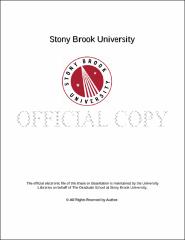| dc.identifier.uri | http://hdl.handle.net/11401/76623 | |
| dc.description.sponsorship | This work is sponsored by the Stony Brook University Graduate School in compliance with the requirements for completion of degree. | en_US |
| dc.format | Monograph | |
| dc.format.medium | Electronic Resource | en_US |
| dc.language.iso | en_US | |
| dc.publisher | The Graduate School, Stony Brook University: Stony Brook, NY. | |
| dc.type | Dissertation | |
| dcterms.abstract | Memory is not of the past, it is of the present and it is of the future. This insight, developed by Henri Bergson in Matter and Memory is the subject of this dissertation. Focusing on the figural representations in Matter and Memory, I argue that Bergson presents a dynamic conception of memory that can be read as destabilizing fixed notions of the human subject. I closely examine the implications of Bergson’s positive account of memory, demonstrating that his account is primarily oriented toward showing how memory is useful for action in the present. I continue to develop this dynamic model of memory by turning to Marcel Proust, Friedrich Nietzsche, and the interpretive work of Gilles Deleuze. In doing so, I explore the possibilities for gaining access to a past that exists beyond the interest of the present moment, of ‘saving the past’ in order to discover new creative means of transforming the self. | |
| dcterms.abstract | Memory is not of the past, it is of the present and it is of the future. This insight, developed by Henri Bergson in Matter and Memory is the subject of this dissertation. Focusing on the figural representations in Matter and Memory, I argue that Bergson presents a dynamic conception of memory that can be read as destabilizing fixed notions of the human subject. I closely examine the implications of Bergson’s positive account of memory, demonstrating that his account is primarily oriented toward showing how memory is useful for action in the present. I continue to develop this dynamic model of memory by turning to Marcel Proust, Friedrich Nietzsche, and the interpretive work of Gilles Deleuze. In doing so, I explore the possibilities for gaining access to a past that exists beyond the interest of the present moment, of ‘saving the past’ in order to discover new creative means of transforming the self. | |
| dcterms.available | 2017-09-20T16:50:49Z | |
| dcterms.contributor | O'Byrne, Anne | en_US |
| dcterms.contributor | Casey, Edward S | en_US |
| dcterms.contributor | Craig, Megan | en_US |
| dcterms.contributor | Hill, Rebecca. | en_US |
| dcterms.creator | Mcleod, Danae | |
| dcterms.dateAccepted | 2017-09-20T16:50:49Z | |
| dcterms.dateSubmitted | 2017-09-20T16:50:49Z | |
| dcterms.description | Department of Philosophy. | en_US |
| dcterms.extent | 155 pg. | en_US |
| dcterms.format | Application/PDF | en_US |
| dcterms.format | Monograph | |
| dcterms.identifier | http://hdl.handle.net/11401/76623 | |
| dcterms.issued | 2015-12-01 | |
| dcterms.language | en_US | |
| dcterms.provenance | Made available in DSpace on 2017-09-20T16:50:49Z (GMT). No. of bitstreams: 1
Mcleod_grad.sunysb_0771E_12311.pdf: 1010967 bytes, checksum: b9054b3e261efab5f0e6f4a75c6948d7 (MD5)
Previous issue date: 1 | en |
| dcterms.publisher | The Graduate School, Stony Brook University: Stony Brook, NY. | |
| dcterms.subject | Bergson, Deleuze, memory, Nietzsche, Proust, subjectivity | |
| dcterms.subject | Philosophy | |
| dcterms.title | Living the Past: Bergson, Proust, Deleuze and Nietzsche on Memory and the Self | |
| dcterms.type | Dissertation | |

